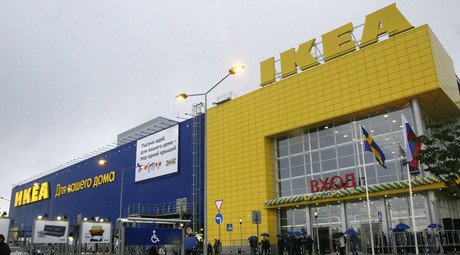IKEA cheapskate: Billionaire founder shops at flea markets, barely pays taxes

Although he’s certainly not short on cash, IKEA founder and multi-billionaire Ingvar Kamprad has admitted he buys most of his clothes at flea markets.
Kamprad, who turns 90 on March 30, is known for being frugal, particularly when it comes to IKEA’s taxes, but in a new documentary being broadcast in his home country of Sweden, he admits that he’s also not too keen on handing over too much for his clothing.
“I don't think I'm wearing anything that wasn't bought at a flea market. It means that I want to set a good example,” he told Swedish channel TV4, The Local reports.
Pay your tax you grotty old miser. #IKEA billionaire Ingvar Kamprad buys second-hand clothes to save money https://t.co/hHzHCpRezo
— Taylor Sluggish (@_beNZed) March 10, 2016
With all the tax breaks, sweetheart deals for mega Corp, profit needs distributed, jobs, services, help those 1%! https://t.co/Zb9Drkq5mm
— Kansas Von Kanarse (@KansasVon) March 10, 2016
Although Bloomberg ranked Kamprad as the ninth richest man in the world with a worth of $41.2 billion, Kamprad says it is “in the nature of Smaland to be thrifty,” referring to region where IKEA’s first store was opened in 1943.
The public were also given an insight into his penny pinching ways in 2008 when he admitted that paying €22 ($24) for a haircut in the Netherlands was too much.
“Normally, I try to get my haircut when I'm in a developing country. Last time it was in Vietnam," Kamprad said.
Both Kamprad and IKEA’s wealth have often been under scrutiny, although Kamprad himself hasn’t been shy about avoiding taxes, having fled Sweden in 1973 due to the country’s high rate.
At the time, Kamprad moved to Denmark before moving again three years later as he was able to secure a lower tax rate in Switzerland, where he lived until 2013, when he moved home to Sweden.
Only last month, the furniture company was accused of evading over €1 billion ($1.1bn) in taxes between 2009 and 2014 in the EU.
The Green Party issued a report to the European Parliament which outlined how IKEA’s “convoluted corporate structure” was designed to facilitate profit-sharing and tax avoidance “on a grand scale.”
The report shows how the company’s structures basically mean it pays royalties to itself to reduce overall taxation and from 1991 to 2014 managed to avoid paying tax on 84 percent of the €14.3 billion ($16 bn) in royalty income by using Dutch based conduit company.
Explains company's tax minimisation? HT #Billionaire who founded #Ikea so frugal he only wears 2nd hand clothes https://t.co/sSv039ZZmj
— Robert Fairhead (@tallandtrue) March 10, 2016
Interesting. Should we condemn such extreme thriftiness along with tax dodging? It's all hoarding. https://t.co/acztd218hG
— Katy Wright (@KatyWright) March 10, 2016
The report detailed its belief that the revenue was channeled to the Interogo Foundation which is based in Liechtenstein, a well known tax haven.
Interogo Foundation is, as IKEA states on its website, “the ultimate owner of Inter IKEA Group, including Inter IKEA Systems B.V., the worldwide IKEA franchisor and owner of the IKEA Concept.”
IKEA denied the report’s allegations of dodging tax, stating that the group “pays taxes in accordance with laws and regulations, wherever we are present,” adding that the manage their operations “in a responsible way.”














